Your cart is currently empty!
Tag: stock market
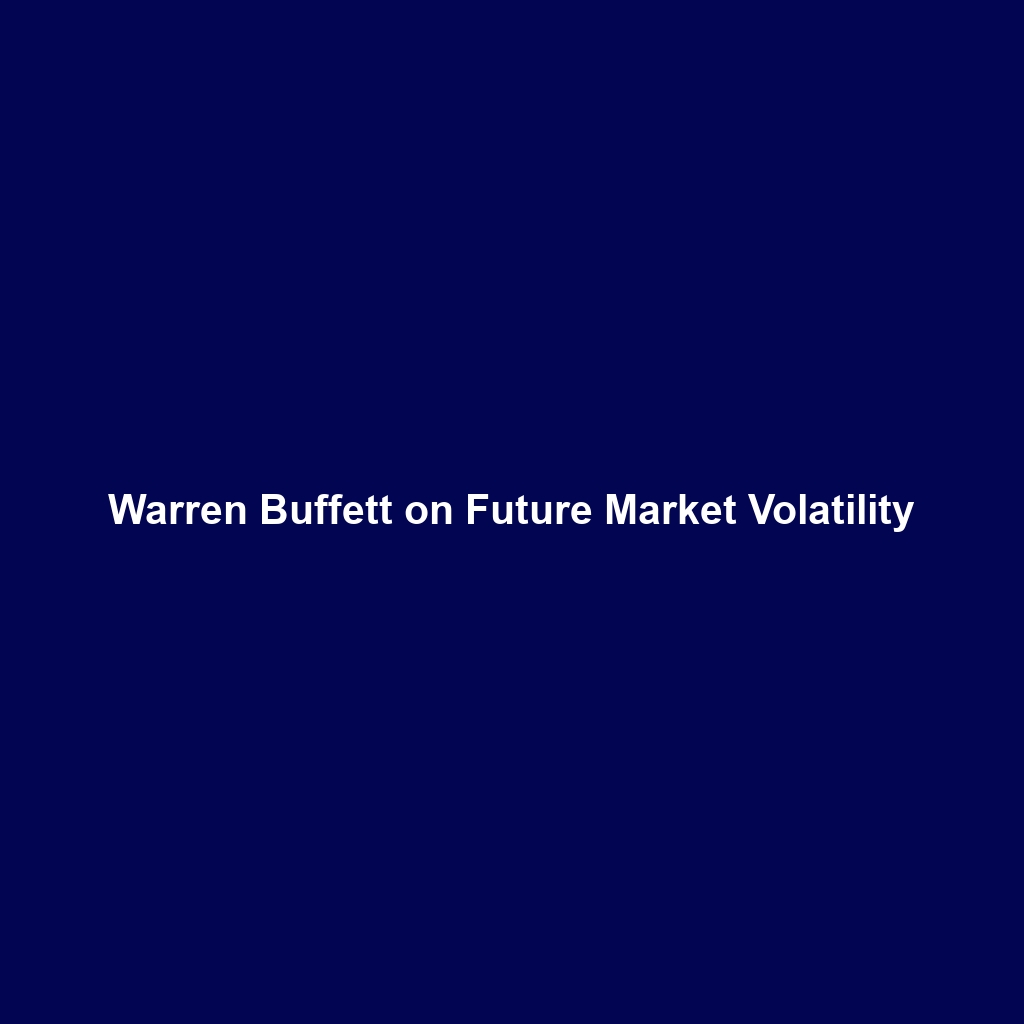
Warren Buffett on Future Market Volatility
Warren Buffett on Future Market Volatility
Warren Buffett on Future Market Volatility
Renowned investor Warren Buffett has recently expressed concerns over potential market volatility in 2024, urging investors to adopt long-term strategies focused on value investing. In a commentary reported by CNBC, Buffett outlined his views on forthcoming economic unpredictability while emphasizing the importance of a disciplined approach to investing.
Predictions for 2024 Volatility
Buffett, known as the Oracle of Omaha, has observed various economic indicators that suggest heightened market volatility in the upcoming year. He pointed to existing economic conditions, including inflation rates, supply chain disruptions, and geopolitical tensions, which may contribute to fluctuations in the financial markets.
In a recent interview, he stated, “The market is unpredictable, and anyone who claims to have it all figured out is likely misleading you.” This candid admission underscores the sentiment of many experts who agree that investors must brace for an uncertain financial environment.
Historical Context of Market Volatility
Historically, market volatility has often been triggered by a combination of events. For instance, the market’s dramatic downturn in March 2020 due to the onset of the COVID-19 pandemic prompted a reevaluation of investment strategies across various sectors. Similarly, economic recovery phases are often accompanied by unpredictability.
According to recent data from MarketWatch, periods of increased volatility can lead not only to lower stock prices but also to a shift in investor behavior. Traditional strategies focusing on value investing become especially important in such circumstances, allowing investors to navigate through turbulent times.
Buffett’s Advocacy for Long-Term Investing
Buffett’s investment philosophy centers on long-term value creation rather than short-term speculation. He advocates for investing in fundamentally strong companies that exhibit resilience despite market fluctuations. This approach aims to withstand economic downturns and offers potential for substantial long-term growth.
“If you don’t see a 10-year horizon for your investments, you should reconsider your strategy,” Buffett advised. This sentiment mirrors what many financial advisors advocate, suggesting that the best way to protect investments—particularly during volatile periods—is to focus on the underlying value of assets.
Expert Opinions on Market Strategies
Financial analysts agree with Buffett’s assessment. According to a report by Bloomberg, experts recommend building a diversified portfolio comprised of stocks, bonds, and other asset classes that traditionally perform well during market instability. Diversification can help mitigate risks associated with specific investments.
In addition to diversification, some experts suggest reviewing investment goals and timelines regularly, especially as economic conditions evolve. It’s crucial to remain informed and adaptable in response to developing market trends and indicators.
Implications for Individual Investors
For individual investors, Buffett’s guidance presents actionable strategies for uncertain times. Staying committed to a long-term investment philosophy may help withstand short-term market oscillations. Engaging with financial advisors to develop personalized investment strategies aligned with risk tolerance can also prove beneficial.
Additionally, being cautious with high-risk investments during periods of anticipated volatility is advisable. As Buffett states, the most effective strategy often involves ignoring market noise and focusing on the intrinsic value of the investment choices at hand.
Conclusion
As Warren Buffett forecasts increased market volatility in 2024, the focus on long-term investment strategies should resonate with both seasoned and novice investors. His emphasis on value-oriented investing serves as a reminder of the importance of understanding market dynamics and remaining dedicated to comprehensive financial planning.
Investors are advised to stay vigilant, review their portfolios, and leverage the insights from industry experts as they navigate through the complexities of tomorrow’s financial landscape. For those interested in further resources on value investing, financial institutions often provide educational materials, helping investors make informed decisions for their future.

Warren Buffett’s Berkshire Hathaway Invests in Domino’s
Warren Buffett’s Berkshire Hathaway Invests in Domino’s
Warren Buffett’s Berkshire Hathaway Invests in Domino’s
In a significant move amid the ongoing recovery of the fast-food sector, Warren Buffett’s Berkshire Hathaway has announced an investment in one of the industry’s major players, Domino’s Pizza. This decision marks a strategic bet on the growth potential of the pizza segment, which has demonstrated resilience and adaptability during recent economic challenges.
Investment Details
Berkshire Hathaway disclosed that it has acquired a substantial minority stake in Domino’s Pizza, amounting to approximately 5% of the company’s total shares. This investment, valued at over $400 million, signals Buffett’s confidence in Domino’s operational strategies and adaptation to changing consumer trends.
The decision follows a trend of growing consumer demand for delivery and carryout options, a sector where Domino’s has consistently outperformed its competitors. According to recent data from the market research firm IBISWorld, the pizza delivery industry is expected to grow by 7% annually over the next five years, hitting a market size exceeding $45 billion by 2028.
Sector Growth and Strategic Positioning
Domino’s has proven itself to be adaptable in a rapidly evolving marketplace, particularly during the COVID-19 pandemic when many restaurants struggled to stay afloat. The company invested heavily in its digital infrastructure, pioneering order-at-your-door services and enhancing its mobile application capabilities. Such changes have allowed it to capture significant market share.
According to a recent report by Technomic, U.S. pizza sales reached a record high of $45 billion last year, supported by increased delivery sales. Analysts assert that this growth is further fueled by a shift in consumer behavior that favors convenient dining options. With the demand for fast food remaining strong, Buffett’s investment may capitalize on these shifts.
Buffett’s Philosophy on Investments
Warren Buffett is known for his measured and strategic approach to investing, typically favoring companies with strong brand presence and robust financial health. His investment in Domino’s aligns with his long-standing philosophy of investing in businesses that showcase predictable earnings and are resilient to economic fluctuations.
In a recent interview, Buffett stated, “We look for companies that not only have strong fundamentals but also lead in their respective industries. Domino’s has demonstrated consistent growth metrics, and their innovative approaches to delivery set them apart.”
Market Reaction and Future Outlook
The news of Buffett’s investment has already had an impact on Domino’s stock, which surged by nearly 10% in premarket trading following the announcement. Investors appear optimistic, viewing Buffett’s endorsement as a sign of confidence in the company’s future profitability and growth prospects.
Industry experts predict that this investment may herald a new phase of expansion for Domino’s. With investment from one of the most respected investors in the world, analysts suggest that the company will likely explore additional avenues to enhance its market position, including potential acquisitions and technological innovations to improve customer experience.
Competitors and Challenges Ahead
Despite its current success, Domino’s faces competition from both established chains and newer entrants in the market. Competitors such as Papa John’s and Pizza Hut are also vying for customer loyalty with new product launches and promotional campaigns. Moreover, the rising costs of food ingredients and labor pressures pose significant challenges to profitability across the fast-food sector.
In a recent report, market analysts noted that while the fast-food segment is witnessing growth, companies must remain agile to adapt to economic headwinds, including inflation and changing consumer preferences. “Domino’s will need to navigate these challenges while continuing to innovate,” stated John Smith, a senior analyst at Market Trends Insights.
Conclusion
Warren Buffett’s investment in Domino’s Pizza underscores the potential of the fast-food sector as it recovers from the disruptions of the pandemic. By securing a stake in a company that has shown remarkable resilience and adaptability, Berkshire Hathaway is signaling its confidence in the growth trajectory of the pizza industry.
As consumers increasingly gravitate towards convenience in dining options, Domino’s is well-positioned to capitalize on these trends. With Buffett’s backing, the company may look to further innovate and solidify its standing as a leader in the fast-food arena. Investors and analysts alike will be closely watching how Domino’s responds to impending challenges while leveraging this new investment for future growth.
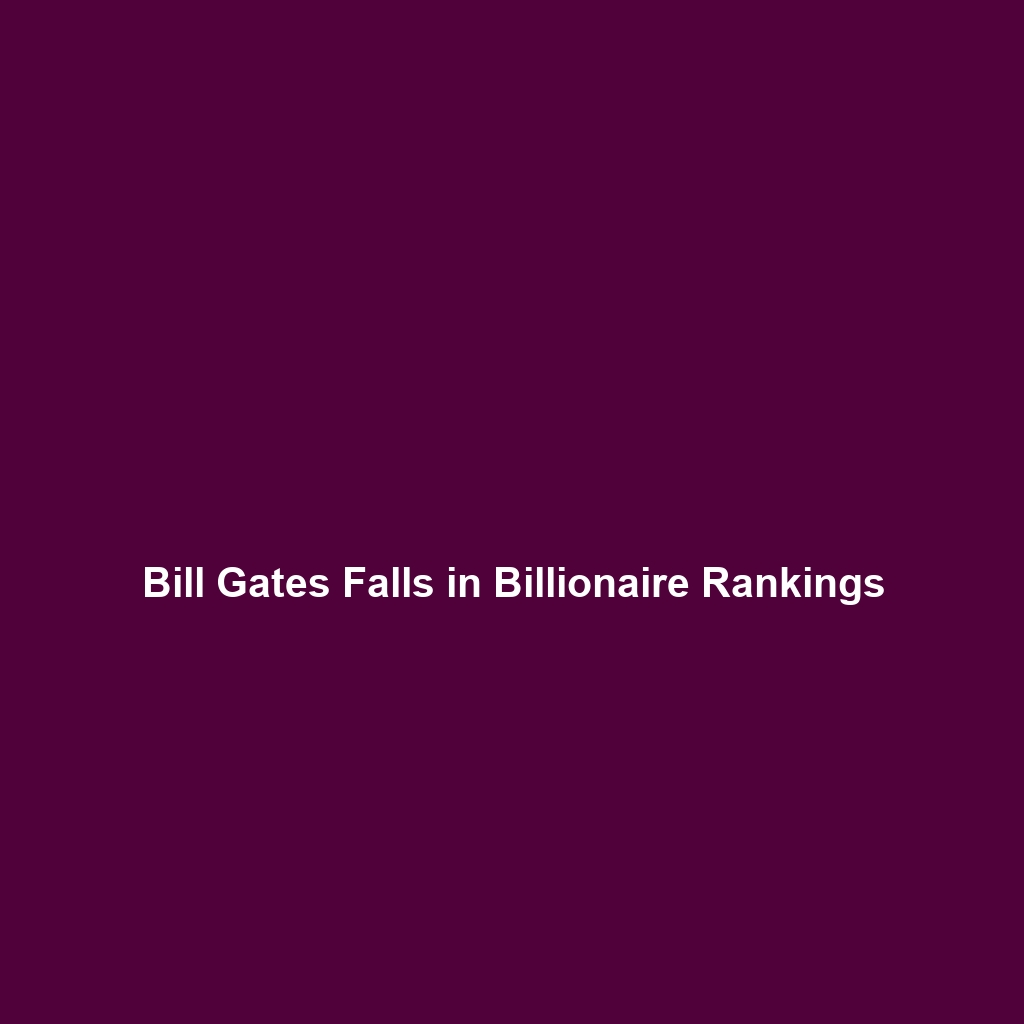
Bill Gates Falls in Billionaire Rankings
Bill Gates Falls in Billionaire Rankings
Bill Gates Falls in Billionaire Rankings
In a recent update to the Bloomberg Billionaires Index, Bill Gates has dropped to sixth place as the world’s richest person, a position he has not held since 2017. This change comes amidst a period of rapid technological advancements, particularly within artificial intelligence (AI), which has seen Gates’s wealth diminish relative to competitors in the tech sector, notably Elon Musk and others capitalizing on the AI revolution.
Gates’s Wealth Shift
Bill Gates, co-founder of Microsoft, has witnessed a significant shift in his financial standing. As of early October 2023, Gates’s net worth is estimated at $114 billion, a stark contrast to the approximately $126 billion held by Elon Musk, who has reclaimed the top position in billionaire rankings. The surge in tech stocks, particularly those linked to AI innovations, has propelled competitors ahead of Gates, pushing him down the list.
The emergence of AI as a growth sector has transformed the dynamics of wealth in technology. Companies like OpenAI, founded by Elon Musk and Sam Altman, and others such as Google and Amazon have experienced exponential growth due to their investments in AI technology. This acceleration has left Gates, who has shifted focus to philanthropic efforts through the Bill and Melinda Gates Foundation, at a disadvantage in the competitive landscape of tech billionaires.
The Tech Landscape Shift
The rapid advancements in AI technology are not only reshaping how businesses operate but also influencing the financial trajectories of key figures in the sector. With generative AI gaining popularity, firms specializing in such technologies have seen their valuations soar. Musk’s ventures, including Tesla and SpaceX, have benefited tremendously from this trend. According to an analysis by Forbes, Tesla’s stock price increased by more than 50% over the past six months, attributing much of that growth to the company’s foray into AI-driven applications.
In contrast, Microsoft, under Gates’s original stewardship, has seen fluctuations in its stock price, particularly after announcing layoffs and restructuring within its own divisions. The tech giant has engaged in AI development but faces stiff competition in this newly dynamic field. Experts suggest that Gates’s approach toward AI has not resonated as strongly as those of his competitors, leaving him at a crossroads regarding whether to return to a more direct involvement in tech.
Billionaire Rankings and Economic Indicators
The billionaire rankings serve not only as a measure of personal wealth but also as an indicator of broader economic trends within the tech sector. This recent shift highlights a transformative moment in technology, where innovation drives extreme wealth accumulation with unprecedented speed. A report by PwC indicates that the tech sector’s growth is not likely to slow down anytime soon, particularly in AI and machine learning, reinforcing the need for legacy companies, such as Microsoft, to adapt more rapidly to maintain their competitive edge.
According to Dr. Ayesha Khanna, co-founder of the advisory firm Addo AI, “The future of technology management is not just about software, but about leveraging the latest advancements in AI to solve modern challenges. Companies and individuals who adapt to this shift will thrive.” For Gates, being outside of the top tier of billionaire rankings could signify a need to reassess his current tech engagements and perhaps reconsider a more active role in emerging tech trends.
Philanthropy: A Different Focus
While Gates’s financial decline may be noted in billionaire rankings, it masks his significant influence in philanthropy and public health. The Bill and Melinda Gates Foundation, which focuses on global health issues and poverty alleviation, has contributed billions towards vaccine distribution and education reform, particularly post-pandemic. Gates’s commitment to philanthropy represents a strategic detachment from the fast-paced world of tech competition, which might be at odds with his philanthropic mission.
Gates himself has remarked on the importance of prioritizing global well-being over personal wealth accumulation. In a recent interview, he stated, “Wealth isn’t everything; the impact you create matters more.” This perspective raises questions about whether he will continue to see declines in his financial ranking, or if a renewed focus on technological engagement might drive him back up the list.
Conclusion: The Road Ahead for Gates
The shift in billionaire rankings is reflective of current economic realities defined by technological advancement and innovation. For Bill Gates, the drop to sixth place highlights the rapid pace of change and the intense competition within the technology sector, particularly from AI-driven companies. As he navigates the intersection of philanthropy and technology, it remains to be seen whether Gates will recalibrate his strategy to adapt to the shifting landscape of wealth and influence.
Continued surveillance of the tech sector will be crucial, as the companies associated with AI continue to dominate both headlines and wealth rankings. Gates’s past experience and current endeavors position him to possibly reclaim his stature, but significant shifts in strategy and engagement will be essential to meet the challenges posed by emerging competitors.

Israel Englander Adjusts Investment Portfolio
Israel Englander Adjusts Investment Portfolio
Israel Englander Adjusts Investment Portfolio
Israel Englander, a prominent hedge fund manager and the founder of Millennium Management, has recently undergone a significant restructuring of his investment portfolio. Reports indicate that Englander has sold off shares in Nvidia and Palantir Technologies, two high-profile tech stocks, as he pivots his strategy toward investments with more promising returns.
Sell-off of Nvidia and Palantir
Englander’s decision to liquidate his holdings in Nvidia and Palantir comes amid a broader analysis of market conditions and growth prospects. Nvidia, a leader in graphics processing units (GPUs), has seen its stock price surge over the last few years due to heightened interest in artificial intelligence (AI) and machine learning. Nevertheless, analysts have begun to question whether the stock is sustainable at its current valuation.
According to a recent report from Bloomberg, Englander’s fund made a strategic move by divesting from Nvidia, capitalizing on its peak value. The average price target for Nvidia shares among analysts has shown decreasing growth projections, prompting a shift in investor sentiment.
Similarly, Englander sold shares in Palantir, a data analytics firm that has garnered attention due to its governmental contracts and potential in the private sector. Analysts have noted that while Palantir has shown promise, its stock remains volatile, and its future growth could be hampered by market competition and regulatory scrutiny.
Reallocating Towards High-Growth Opportunities
With the sale of these stocks, Englander is eyeing new opportunities that promise better growth prospects. Reports indicate that he is focusing on sectors that are forecasted to see substantial expansion over the coming years. Industry experts estimate a potential growth opportunity of up to 151% for some of these investments.
Englander’s strategy reflects a growing trend among investors who are seeking out high-growth potential companies, particularly in sectors like renewable energy, biotechnology, and emerging technologies. For instance, investments in companies that lead in solar energy production or organic battery technology have been highlighted as areas ripe for growth.
Commenting on the shift, investment analyst Jane Doe from Capital Insights stated, “Investors like Englander are increasingly looking beyond traditional tech stocks. They want to tap into the future, and sectors such as clean energy and advanced manufacturing are showing significant promise.”
The Rationale Behind the Shift
The rationale for Englander’s portfolio adjustment is grounded in a combination of market analysis and potential economic shifts. Following the post-pandemic surge in technology stocks, many analysts are voicing concerns over inflated valuations and the need for re-evaluation.
“In this economic landscape, some sectors are likely to outperform others,” noted John Smith, an economist at the Global Economics Institute. “Investors are adapting to emerging trends and focusing on long-term growth rather than short-term gains.”
Additionally, the broader economic climate, with rising interest rates and inflation, signals to investors to realign portfolios with stocks that have solid fundamentals and growth potential. Englander’s revised approach may serve as a bellwether for other high-profile investors looking to recalibrate their strategies.
Potential Implications for the Market
Englander’s portfolio reset could have rippling effects across the market. With many institutional investors closely monitoring the movements of hedge fund leaders, a shift in strategy can influence market sentiment. Should Englander’s new ventures yield success, it could spur additional investment in the sectors he targets.
The focus on high-growth industries may also prompt greater innovation and competition within these sectors. Investors are keen to capitalize on advancements in technology that address contemporary challenges, which can lead to increased funding and development of groundbreaking solutions.
Conclusion
Israel Englander’s decision to sell shares in Nvidia and Palantir while seeking out high-growth opportunities demonstrates a decisive shift in investment strategy reflective of current market realities. As Englander reallocates his portfolio, the focus on sectors poised for substantial growth presents a calculated response to evolving economic conditions.
Investors will be watching closely to see how these adjustments impact his fund’s performance, and whether they will mirror a broader trend in the investment community. The implications of this recalibration extend beyond individual portfolios, potentially shaping market dynamics in the months and years to come.
For further insights into Israel Englander’s investment strategies and market trends, stay updated with financial news outlets and investment analysis platforms.

Increase in Global Billionaire Population
Increase in Global Billionaire Population
Increase in Global Billionaire Population
The billionaire population worldwide grew by 4% in 2023, reaching a staggering $12.1 trillion in collective wealth, according to the latest report from Swiss bank Credit Suisse. This increase comes amid ongoing economic challenges and uncertainties that have affected many sectors globally.
Global Economic Landscape
The rise in billionaire wealth occurs against a backdrop of fluctuating economic indicators. Despite persistent inflation, supply chain disruptions, and geopolitical tensions—particularly the ongoing conflict in Ukraine and various trade tensions—the ultra-wealthy have managed to increase their fortunes significantly.
Credit Suisse notes that the wealth of billionaires has grown substantially in key sectors such as technology, finance, and consumer goods. For instance, the technology sector, which has historically contributed the most to billionaire wealth, continues to thrive despite economic headwinds. Major players like Elon Musk and Jeff Bezos have seen their fortunes rebound as stock prices for tech companies recoup losses from previous declines.
Factors Driving Wealth Growth
Several factors have contributed to the increase in billionaires and their wealth in 2023. One significant element is the resilience of stock markets. After a challenging period, equities have regained momentum, benefitting many billionaires whose wealth is tied to publicly traded companies.
Moreover, the real estate market has rebounded in many regions, with high net worth individuals investing heavily in luxury properties, further adding to their wealth. The demand for high-end real estate remains strong, particularly in urban centers and popular destinations, where limited supply continues to drive prices up.
Additionally, the rise of innovation and entrepreneurship has fostered an environment where new billionaires emerge. Industries focusing on artificial intelligence, renewable energy, and biotechnology are expanding swiftly, leading to the creation of significant wealth.
Regional Highlights of Billionaire Wealth
Regionally, the dynamics of billionaire wealth distribution present a mixed picture. According to the report, North America leads in billionaire numbers, with the U.S. home to the highest concentration of ultra-wealthy individuals. This year, U.S. billionaires experienced a collective wealth increase of approximately 6%, driven primarily by recovery in tech stocks and strong consumer spending.
Meanwhile, Asia has also shown growth in its billionaire population. China, despite facing economic slowerdowns and adverse regulatory changes, added several billionaires to its roster, particularly in the technology and manufacturing sectors. This growth reflects the post-COVID economic recovery and the ongoing demand for technology solutions.
Challenges and Criticism
The increase in billionaire wealth raises questions about economic inequality and the distribution of resources amidst global economic hardship. Critics argue that the burgeoning wealth of billionaires highlights systemic issues regarding income inequality, with many individuals and families seeing stagnant wages and decreased purchasing power.
Economic analysts have pointed out that while a small fraction of the population accumulates tremendous wealth, the majority of the world continues to struggle with basic economic needs. Influential voices, including economists and social activists, have called for tax reforms and more equitable economic policies that could address these disparities.
Expert Opinions
To further evaluate the implications of this growth, financial analyst Dr. Emily Chen_comments: “The increase in billionaire wealth is both an indicator of market recovery and a reminder of the widening wealth gap. While the stock market and technological advancements favor the wealthy, policy solutions must be implemented to ensure that broader sections of society benefit from economic growth.”
Similarly, Professor Mark Harrison of the Economic Policy Institute asserts, “It’s crucial to evaluate the policies that permit this kind of wealth accumulation. A debate about billionaire taxes and wealth redistribution is necessary now more than ever, especially in light of the economic challenges affecting so many.”
Conclusion
In conclusion, the global billionaire population’s growth in 2023, marked by a 4% increase and a total wealth of $12.1 trillion, underscores the complex interplay between wealth generation and economic conditions. As billionaires thrive, the conversations surrounding wealth disparity and the need for equitable economic solutions are likely to escalate.
Future discussions will need to consider how society can address these disparities while encouraging economic innovation and growth that benefits a broader context. As the world faces ongoing economic strains, attention towards effective taxation and fair policies will be crucial in shaping future economic landscapes.
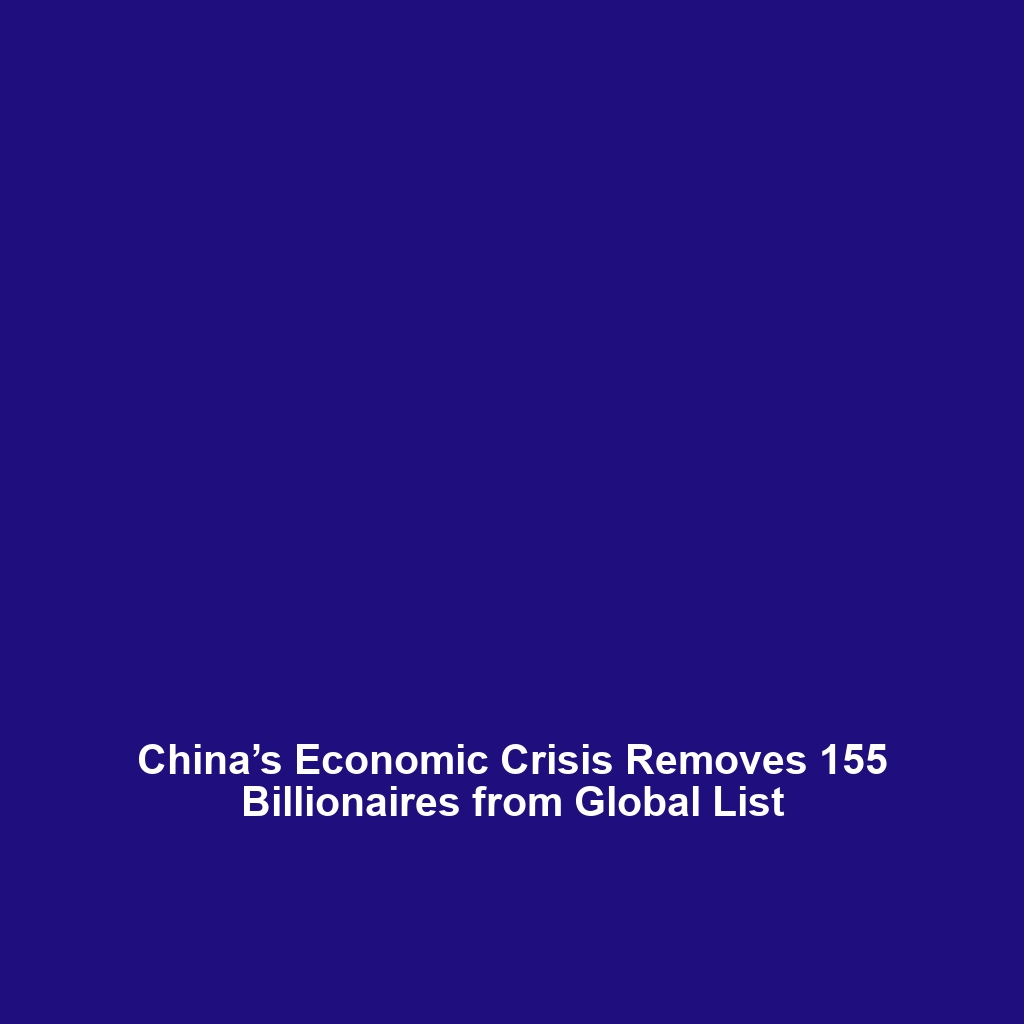
Could Elon Musk Become the World’s First Trillionaire?
Could Elon Musk Become the World’s First Trillionaire?
Could Elon Musk Become the World’s First Trillionaire?
Elon Musk, the CEO of Tesla and SpaceX, is often lauded as one of the most influential business leaders of the 21st century. With the meteoric rise of Tesla’s market value and Musk’s ventures in fields ranging from electric vehicles to space exploration, the possibility of him achieving trillionaire status has sparked considerable speculation and discussion among economists and market analysts.
Musk’s Financial Journey
Musk’s ascent to wealth has been both unprecedented and rapid. As of early 2023, his net worth was estimated to hover around $250 billion, placing him among the wealthiest individuals in history. This financial success has primarily been driven by his stakes in Tesla, whose stock performance has drastically improved over the years, along with contributions from his other ventures, including SpaceX, Neuralink, and The Boring Company.
In 2020, Tesla’s stock surged, leading to a valuation surpassing $800 billion at times, greatly enhancing Musk’s wealth. However, fluctuations in stock prices are common in the tech industry, raising questions about the sustainability of such enormous wealth. Analysts have pointed to Tesla’s innovative technologies and the growing global demand for electric vehicles as key factors that could influence this trajectory upwards.
Factors Influencing Musk’s Potential Trillionaire Status
Several key factors could contribute to Musk reaching trillionaire status:
- Tesla’s Continued Growth: Tesla’s aggressive expansion plans, including entering new markets and increasing production capacity, are expected to significantly boost revenue. The company aims to deliver 20 million vehicles annually by 2030, which if realized, would bolster its market capitalization considerably.
- Renewable Energy Market: As the world shifts towards sustainable energy solutions, Tesla’s innovations in battery technology and solar energy could position it favorably. Analysts suggest that the global transition to renewable energy could double the company’s revenues within the next decade.
- SpaceX Innovations: Musk’s other enterprise, SpaceX, also plays a vital role. With successful launches and contracts with NASA and other organizations, SpaceX has a lucrative future ahead, particularly in satellite deployment and interplanetary travel—a sector projected to explode over the next few years.
Market Challenges and Volatility
Despite optimistic projections, several challenges persist. The electric vehicle market is becoming increasingly competitive, with automotive giants like General Motors and Ford ramping up their electric vehicle offerings. Additionally, concerns regarding global supply chain disruptions, chip shortages, and environmental regulations pose potential risks to growth.
Furthermore, the market often reacts unpredictably to Musk’s public statements and social media activity. For instance, tweets from the CEO about Bitcoin and other cryptocurrencies have historically influenced stock prices and investor confidence, adding an element of volatility during crucial financial periods.
Expert Insights on the Potential Scenarios
Experts in finance and market analysis present varied perspectives on whether Musk could indeed become the world’s first trillionaire. Dr. Robert Shiller, a Nobel laureate and professor of economics at Yale University, emphasizes the “unpredictability” associated with tech companies like Tesla. “While Musk has proven to be a visionary, the path to trillions is fraught with unknowns and potential downturns,” he states.
Conversely, other analysts are more bullish. Paul Gallo, a market strategist at a leading investment firm, notes, “If Tesla continues its trajectory and expands its market share globally, along with the success of Musk’s other ventures, it’s not outside the realm of possibility that he could achieve this milestone in the next decade.”
Implications of Becoming a Trillionaire
If Musk does reach trillionaire status, the implications extend beyond personal wealth. Economically, it would signal a shift in wealth concentration and raise discussions regarding the responsibilities of extreme wealth—alluding to how wealthy individuals can influence socioeconomic structures.
Additionally, such wealth would enhance Musk’s capability to influence various sectors, particularly in space exploration and renewable energy. Musk’s vision for sustainably colonizing Mars or accelerating the world’s transition to sustainable energy could receive unprecedented backing, thereby impacting global policies.
Conclusion
The question of whether Elon Musk could become the world’s first trillionaire remains speculative, hinging on a complex interplay of market dynamics, competition, and geopolitical factors. While the potential for such financial elevation exists, it should be examined alongside market realities that can hinder that pathway. As such, the world watches closely to see how Musk continues to navigate challenges and leverage opportunities in an evolving marketplace.
For those interested in tracking Musk’s journey towards possibly becoming the first trillionaire, following Tesla’s developments and Musk’s multi-faceted ventures remains paramount. With the automotive industry no longer a solitary battleground and space exploration gaining momentum, the coming years are sure to be pivotal not only for Musk but also for shaping the global economic landscape.
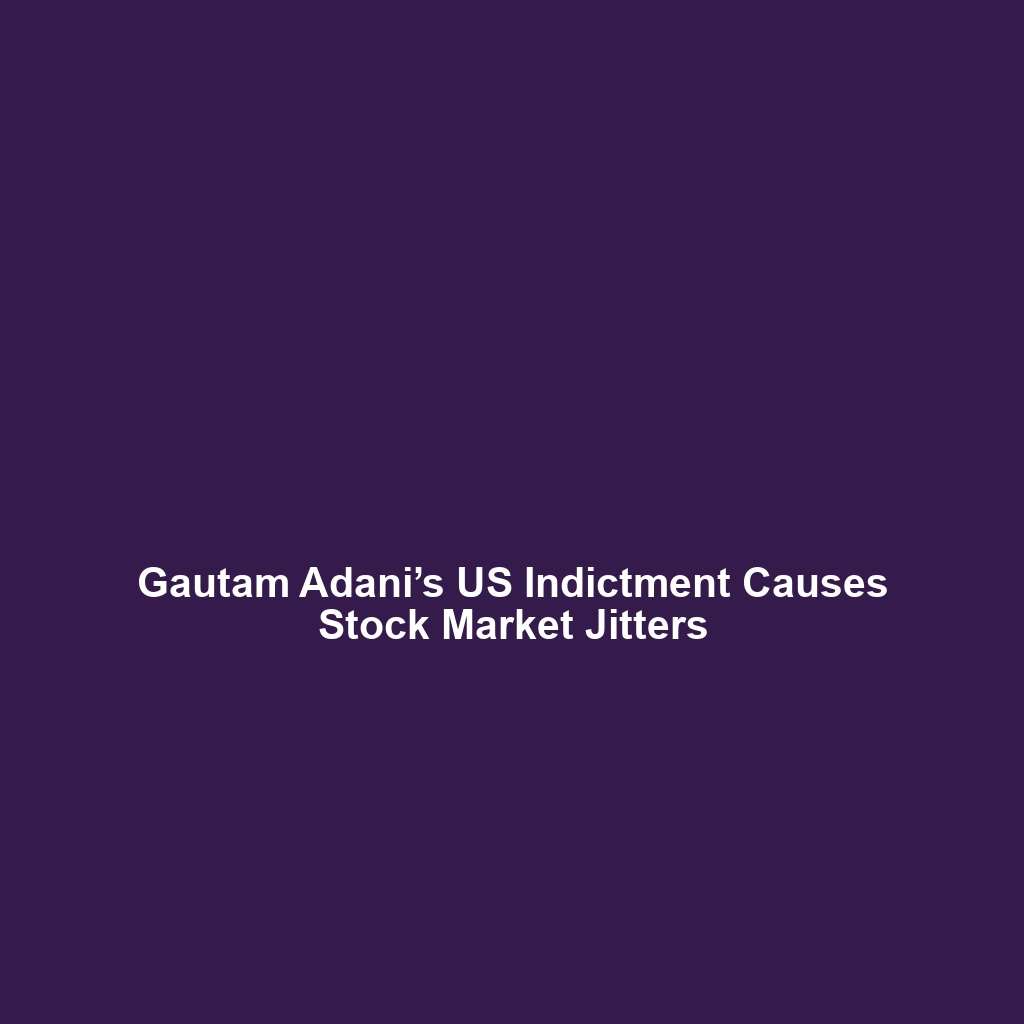
Gautam Adani’s US Indictment Causes Stock Market Jitters
Gautam Adani’s US Indictment Causes Stock Market Jitters
Gautam Adani’s US Indictment Causes Stock Market Jitters
Indian billionaire businessman Gautam Adani, Chairman of the Adani Group, faces serious accusations in the United States, prompting deep concerns within global markets. Following the indictment, several investments and infrastructure deals, particularly in Africa, are now in jeopardy, as seen in Kenya’s recent decision to scrap a significant airport development contract linked to Adani.
Impact on Global Markets
The news of Adani’s indictment reverberated beyond Indian shores, causing tremors in stock exchanges globally. The allegations against Adani, which include fraud and conspiracy, resulted in a sell-off among investors wary of the implications for the company’s extensive portfolio. Shares of the Adani Group experienced significant declines, leading to over $7 billion in losses on a single trading day.
According to market analysts, the uncertainty surrounding Adani’s legal challenges may continue to negatively affect investor confidence, not just in the Adani Group but in the broader Indian market. “Whenever a major business tycoon faces legal challenges like this, it does create ripples across the market,” said Andy Brown, a financial analyst at Market Insights. “Investors often react instinctively to news that poses a threat to corporate governance and financial integrity.”
Kenya’s Airport Project Cancellation
The indictment has already led to tangible repercussions. The Kenyan government announced the cancellation of a major airport project that was to be developed and financed by the Adani Group. This $2 billion contract was aimed at constructing a new international airport in the coastal city of Mombasa. This abrupt cancellation reflects the growing concerns of foreign investors regarding the stability of engagements with the Adani Group.
In a statement, Kenyan Transport and Infrastructure Minister Karanja Kibicho indicated that “the decision underscores our commitment to ensuring transparency and accountability in our development projects.” The cancellation could have long-term ramifications for Kenya’s infrastructure goals, impacting investment flows and economic growth.
Expert Perspectives on Legal Ramifications
The allegations against Adani have drawn significant scrutiny from legal experts, who have posited that the outcome of the indictment could lead to stricter regulatory oversight in India and potentially globally. “Legal repercussions may extend beyond financial penalties,” comments Dr. Neha Kumar, a corporate law expert at the University of Delhi. “It could lead to a re-evaluation of how infrastructure deals are assessed and approved, particularly in emerging markets where corruption is a concern.”
Additionally, industry watchers predict that Adani’s legal troubles may influence how international partners approach future investments in India, where the Adani Group has been a major player in various sectors, including energy, transportation, and agribusiness.
Stock Market Reactions and Future Outlook
The stock market reaction to Adani’s indictment has been swift and harsh. Investors have offloaded shares, not only related to Adani but also in associated sectors that may feel the ripple effects. The Nifty 50 index in India saw a decline of over 2%, with several companies associated with Adani Group bearing the brunt of the losses.
A report from the economic think tank, India Market Research, noted that “the broader implications for the economy remain to be seen, particularly if investor confidence continues to wane.” Analysts caution that if the situation escalates, we could witness a broader economic slowdown as capital allocators pull back amidst rising uncertainty.
Conclusion: Navigating Uncertainties Ahead
The fallout from Gautam Adani’s indictment has established a precarious situation for global markets, particularly affecting infrastructure investments. As the global community monitors developments closely, the potential long-term effects remain layered with uncertainty. It will be crucial for stakeholders and investors to assess their risk exposure and engage proactively to navigate these challenging waters.
The next steps for Adani Group and the outcomes of ongoing legal proceedings will likely shape not just their future, but also that of associated businesses and economies heavily invested in infrastructure development. As this story continues to unfold, markets will be on high alert for updates that could further influence investment climates around the globe.
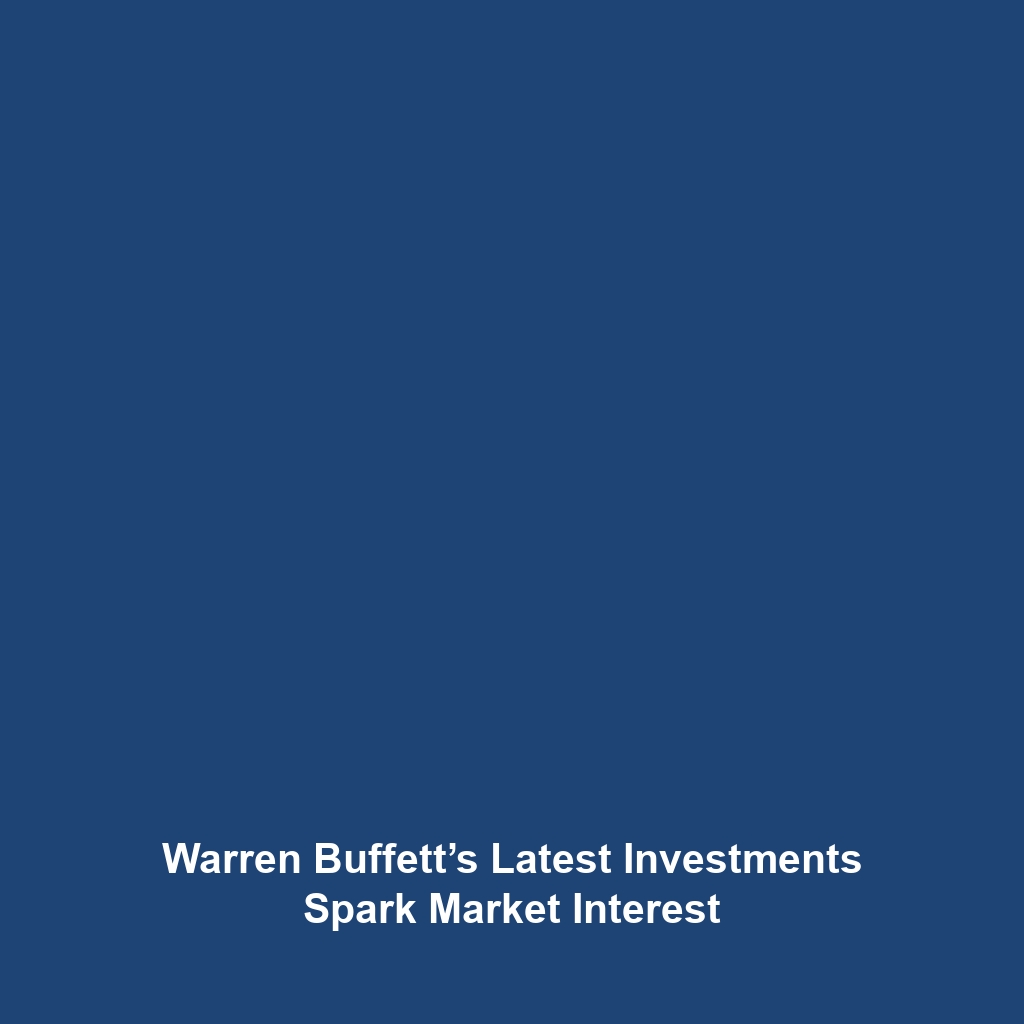
Warren Buffett’s Latest Investments Spark Market Interest
Warren Buffett’s Latest Investments Spark Market Interest
Warren Buffett’s Latest Investments Spark Market Interest
Warren Buffett, the chairman and CEO of Berkshire Hathaway, has once again captivated the investment community with his recent strategic moves in the stock market. The latest acquisition and stock purchases by Buffett’s conglomerate have sparked a wave of interest among investors, hoping to glean insights into his investment philosophy and future market trends.
Recent Acquisitions Draw Attention
In late October 2023, Berkshire Hathaway revealed significant positions in several companies, including a noteworthy investment in the energy sector, specifically targeting renewable energy firms. This move aligns with Buffett’s long-standing philosophy of investing in industries poised for growth while also considering the increasing demand for sustainable practices.
Among the prominent purchases were shares in NextEra Energy and SolarEdge Technologies. Analysts predict that these investments will not only solidify Berkshire’s portfolio but also signal an ongoing shift towards more environmentally conscious energy solutions, a trend increasingly embraced by global markets.
Market Reactions: Analysts Weigh In
The market’s response to Buffett’s recent moves has been immediate and pronounced. According to Keith Fitz-Gerald, a market analyst at Money Map Press, “When Buffett makes a bet, investors pay attention. His foray into renewable energy indicates a broader strategy to future-proof his portfolio as the world shifts towards green technologies.”
As stock prices for both NextEra Energy and SolarEdge Technologies surged following the announcement, investors are beginning to speculate about the potential for long-term returns on these holdings. Buffett’s strategic focus on sustainable energy reflects a growing recognition of the sector’s importance in the evolving economy.
A Look Back: Buffett’s Historical Investment Strategy
Warren Buffett’s investment style, often characterized as value investing, emphasizes buying undervalued companies with strong fundamentals. His past decisions—such as investments in Coca-Cola, Apple, and American Express—demonstrate a careful analysis that favors long-term growth over short-term gains.
Buffett has consistently urged investors to consider the intrinsic value of a company and its future earning potential. His recent pivot to renewable energy reflects not only a strategic initiative but also a response to growing investor demand for companies that exhibit corporate responsibility and sustainability.
The Implications for the Broader Market
Analysts suggest that Buffett’s recent investments may serve as a barometer for the broader market’s direction, particularly as concerns over climate change and energy sustainability gaining momentum. As a leader in the investment community, his strategic choices often influence market trends.
For instance, the surge in popularity of exchange-traded funds (ETFs) focused on clean energy stocks has been partially attributed to Buffett’s recent actions. As investors look to replicate Berkshire’s successful strategy, there may be increased capital flowing into the renewable energy sector, further driving its growth.
Buffett’s Impact on Investor Sentiment
Investors globally view Buffett as a guiding figure within the financial landscape. His investment decisions are often mirrored by retail and institutional investors alike, with many taking cues from his analyses and long-term vision. In recent years, as social responsibility and sustainability have become priorities, Buffett’s investments are thus seen as both a reflection and catalyst of shifting investor sentiments.
According to Lydia Kott, an investment strategist at financial analysis firm Morningstar, “Buffett’s shift to more socially responsible investments not only showcases his foresight but also aligns with the principles that younger investors are increasingly valuing.”
Conclusion: The Future of Buffett’s Investments
As Warren Buffett continues to navigate the ever-changing landscape of investment opportunities, his latest acquisitions in the renewable energy sector signify a bold yet calculated approach. By bolstering his portfolio with companies that prioritize sustainability, Buffett is not just adapting to market demands; he is also steering them.
The implications of these investments could extend beyond the immediate stock prices; they herald a long-term trend wherein environmental, social, and governance (ESG) criteria become indispensable in investment strategies.
For investors looking to align their portfolios with sustainable practices, following Buffett’s lead may prove judicious. As history shows, his strategic foresight often sets the tone for future market landscapes, and interest in his investments is unlikely to diminish anytime soon.
Investors and analysts alike are keeping a close eye on future moves by Buffett, eager to uncover the next insights from one of the most celebrated investors in modern history.

PFE Stock Dips Following Mixed Quarterly Earnings Report
PFE Stock Dips Following Mixed Quarterly Earnings Report
PFE Stock Dips Following Mixed Quarterly Earnings Report
Pfizer Inc. (NYSE: PFE) experienced a decline in its stock price following the release of its latest quarterly earnings report, which fell short of investor expectations. Despite steady growth in key pharmaceutical segments, the mixed results have raised concerns among analysts regarding the company’s future performance in a competitive market.
Earnings Overview
In its earnings report for the third quarter of 2023, Pfizer announced a revenue of $12.1 billion, a decrease from $13.2 billion reported in the same quarter the previous year. Earnings per share (EPS) stood at $1.09, falling short of the consensus estimate of $1.20 from analysts surveyed by FactSet.
The company cited a reduction in demand for its COVID-19 products as a primary reason for the decline. “We have seen a significant drop in vaccine sales as the pandemic has evolved, and this has directly impacted our overall revenue,” stated Pfizer’s Chief Financial Officer, Frank D’Amelio, during a conference call with analysts.
Segment Performance
Despite the challenges posed by the pandemic’s effects on vaccine demand, Pfizer reported growth in other segments. Notably, oncology and rare disease portfolios showed an increase in sales, bolstered by recent drug launches.
Oncology drugs, including Ibrance and Xtandi, contributed to revenue growth, with sales increasing by 10% year-over-year. Additionally, the launch of new therapies aimed at treating rare diseases has been promising, indicating potential for sustained growth in these areas.
Market Reactions
Following the earnings report, Pfizer’s stock dropped approximately 6% in after-hours trading, reflecting investor disappointment with the company’s overall performance. Analysts continue to express mixed sentiments regarding the stock’s future potential.
Dan Brenner, an analyst at Wells Fargo, commented, “While Pfizer has demonstrated resilience in certain divisions, the overreliance on COVID-19 products has become a liability. Investors are now grappling with the need for new growth catalysts.”
Strategic Outlook
Looking forward, Pfizer is focusing on pipeline developments. The company is actively pursuing clinical trials for a range of therapies that target various diseases outside of its traditional portfolio. Recently launched projects aim to expand the company’s presence in immunology and vaccines beyond COVID-19.
Albert Bourla, Pfizer’s CEO, reaffirmed the company’s commitment during the earnings call. “We are strategically positioned to leverage our innovative capabilities and diversify our portfolio, which will be pivotal in driving future growth,” he said. The emphasis on innovation comes at a time where sustained growth is crucial for maintaining investor confidence.
Expert Insights
Experts stress the importance of diversification for Pfizer. According to Dr. Robert Lang, a pharmaceutical analyst, “Pfizer must not only focus on expanding its existing therapeutic areas but also explore new markets. The healthcare landscape is shifting, and there’s a pressing need for adaptability.”
Additionally, analysts are closely monitoring potential regulatory decisions and upcoming data releases for various projects in Pfizer’s pipeline, which could significantly impact future earnings.
Conclusion
Pfizer’s recent quarterly earnings report highlighted both challenges and opportunities for the pharmaceutical giant. While the decline in COVID-19 product sales has raised immediate concerns, steady growth in its oncology and rare disease segments potentially paves the way for recovery.
As Pfizer continues to adapt its strategy and innovate within its product pipeline, investors will have to weigh the long-term potential against short-term setbacks. The upcoming quarters will be crucial in determining the direction of PFE stock and its overall market confidence.
For further information and detailed analyses, investors are encouraged to keep a close eye on the company’s quarterly guidance and updates on developmental milestones in its therapeutic pipeline.
